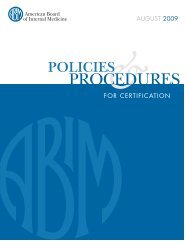The SRA Symposium - College of Medicine
The SRA Symposium - College of Medicine
The SRA Symposium - College of Medicine
Create successful ePaper yourself
Turn your PDF publications into a flip-book with our unique Google optimized e-Paper software.
In particular, the process <strong>of</strong> searching for, applying for, and managing extramural funding is new<br />
territory for these “grant virgins.” Beyond coming up with interesting and novel science, they must<br />
learn the language <strong>of</strong> sponsored research, with its R01’s, F&A, Fastlane and Commons. <strong>The</strong>y must<br />
also learn business practices, policies and processes for their institution and sponsoring agencies.<br />
Mentoring<br />
Mentoring is the standard method that academic medical centers use to teach junior faculty the<br />
skills they need to be an academic researcher. Mentoring has been much described in the literature,<br />
with many definitions and descriptions <strong>of</strong> responsibilities. While there is some disagreement<br />
about terminology, most <strong>of</strong> the research community agrees that mentoring should involve training<br />
and guidance on technical scientific skills as well as career development issues (Werner 2004,<br />
Connor 2000, Bauchner 2002). Table 1 highlights the most commonly identified responsibilities <strong>of</strong><br />
mentoring.<br />
Table 1: Responsibilities <strong>of</strong> the Mentor<br />
• Developing research skills<br />
• Selecting and conducting research projects<br />
• Conducting research ethically<br />
• Presenting research findings<br />
• Completing and submitting manuscripts<br />
• Guidance on balancing work/home life<br />
• Promoting one’s career<br />
• Networking<br />
• Obtaining research funding<br />
• Listening and problem solving<br />
FN: Bauchner 2002; Pololi 2002, IOM 1997 Mott 2002,<br />
Greggs-McQuilkin 2004, Waugh 2002, Tobin 2004,<br />
Ramanan 2002, Connor 2000, Shea 1995, Mason 2003,<br />
Schrubbe 2004, Waugh 2002,Werner 2004<br />
Papers<br />
Most academic medical centers rely on a traditional mentoring system for junior faculty, where<br />
there is one mentor who trains and guides the mentee. One <strong>of</strong> the drawbacks <strong>of</strong> this model is<br />
inherent to the one-on-one model: the mentee only learns what the mentor knows. <strong>The</strong> mentor’s<br />
experience is based on a sample <strong>of</strong> one – his or her personal experience, which may not always<br />
match the mentee’s needs (Waugh 2002, IOM 1997). Another drawback <strong>of</strong> this model is that the<br />
best mentors are usually highly sought leaders, which means that they have less time to spend with<br />
individual mentees (Pololi 2002, Connor 2000, Bauchner 2002). A major criticism <strong>of</strong> the mentored<br />
learning experience is that the mentor does not have enough time to give adequate attention to the<br />
mentee (Mason 2003, Bauchner 2002, Waugh 2002).<br />
Research Administrators<br />
Research administrators in academic institutions are typically involved in supporting investigators<br />
in the procurement or management <strong>of</strong> research funding. This role may take various forms, from<br />
assisting in budget development to ensuring compliance with sponsor regulations to overseeing<br />
a departmental or institutional portfolio <strong>of</strong> sponsored research funding. <strong>The</strong>re are a few areas<br />
<strong>of</strong> knowledge, however, that are common across many research administrators. <strong>The</strong>se individuals<br />
typically have an in-depth familiarity with the various funding mechanisms and agencies that<br />
sponsor research. <strong>The</strong>y know the project timelines and budgetary implications <strong>of</strong> the funding<br />
mechanisms and which sponsors are more likely to sponsor which kind <strong>of</strong> research. Research administrators<br />
also generally know how the review process works for various funding agencies. <strong>The</strong>y<br />
frequently have access to information about who in the institution is doing what kinds <strong>of</strong> research<br />
2005 <strong>Symposium</strong> Proceedings Book 187

















